Trump Claims Israel Helped Plan Soleimani Assassination
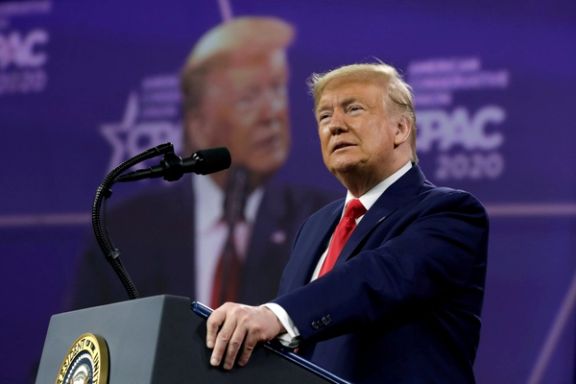
Former US President Donald Trump claimed Israel helped plan the 2020 assassination of Quds Force commander Qassem Soleimani, but pulled out of the operation two days prior to the killing.

Former US President Donald Trump claimed Israel helped plan the 2020 assassination of Quds Force commander Qassem Soleimani, but pulled out of the operation two days prior to the killing.
In an interview with Fox News, Trump said, “When we took out Soleimani, you know Israel was supposed to do it with us. Two days before the take-out, they said, ‘We can’t do it. We can’t do it.’ I said ‘What?’ ‘We can’t do it,'” the Republican presidential frontrunner added.
Despite Israel's withdrawal, Trump claimed he proceeded with the operation in Iraq after consulting with a general who affirmed the possibility of executing it independently. He was killed in a drone strike near Baghdad Airport.
The former president, currently vying for a new presidential term, also highlighted his administration's efforts in deterring attacks by Iranian militias on US forces in a veiled reference to the more than 160 attacks since October 7 alone, under Joe Biden.
Qassem Soleimani was instrumental in arming and training various armed groups across the Middle East as the head of Iran's proxy forces.
Following Soleimani's death, Israeli Prime Minister Benjamin Netanyahu had commended Trump for the strike that eliminated the influential Iranian general in January 2020.
At the time, he said, “Trump is worthy of full appreciation for acting with determination, strongly and swiftly ... We stand fully by the United States in its just battle for security, peace, and self-defense.”

Iran’s 84-year-old ruler Ali Khamenei once again hinted at his doubts about the political challenges his regime faces on Monday, expressing concern over election turnout and other issues.
Khamenei has been sounding increasingly concerned about his regime's legitimacy and influence over the population following mass anti-regime protests in 2022-2023. The October 7 Hamas invasion of Israel and the ensuing war has further challenged the regime’s ability to ease Iran’s economic crisis.
In his latest speech on Monday, one week before the anniversary of the 1979 revolution, Khamenei brought up the issue of his regime's authority, the decline in support for the Islamic ideology, and the expected low turnout in the March 1 election, as a barometer of the people's support for the regime.
The keywords in his speech were authority, the February 11 revolution rally, and a high-turnout election. Although it was not the first time he used those keywords during the past year, but every time he has sounded weaker and more worried.
He also has deep concerns about his own security after the January 3 terrorist attack in Kerman that killed 95 people and was claimed by the ISIS branch in Afghanistan. The serious security breach makes the February 11 rally more of a threat than an opportunity to garner popular support. The regime even ignored a US warning, delivered privately, which could have saved all the lives lost.
Khamenei's sense of insecurity during recent weeks has been so serious that instead of going to places such as an industrial fair and the agricultural market in Tehran, he had the fair and the market brought to his residence where he reviewed his regime's "achievements" in his fortified underground.
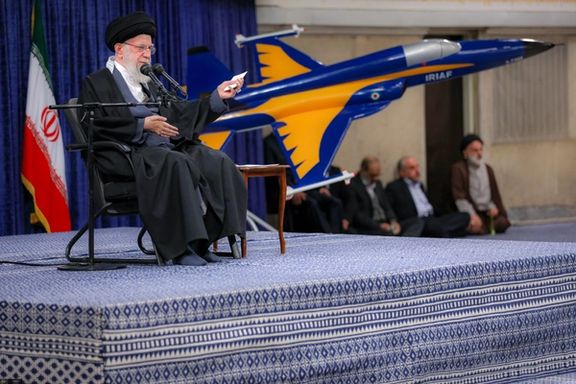
During his Monday speech, Khamenei expressed concerns about insiders and elites, reviving his fears about their loyalty and raising alarms about potential foreign infiltration among his staff. His disconcerted demeanor during the speech became evident when, recounting a pre-revolution visit by the Iranian imperial air force to Ayatollah Khomeini, he praised the country's air force, oblivious to the fact that the imperial air force no longer exists. Its US-made aircraft are over 50 years old, and its few Russian-made jets frequently crash during training flights.
What remains in terms of military power is an aerospace force that develops and launches missiles at neighboring countries. Ironically, this strategy creates more trouble and insecurity than it does project power and authority. Khamenei also praised the Shah's air force for its officers' interactions with Khomeini, claiming that these interactions helped pave the way for the victory of the Islamic revolution.
Since October 7, Khamenei's departure from his hardline revolutionary stance has diminished his standing among his fervent supporters in Iran. As he abandoned his proxy groups in Gaza, Iraq, Lebanon, and Syria, he lost the support he had hoped to gain in the Middle East. He not only renounced his previous boasts about the Resistance Movement but also urged proxy groups to distance themselves from Tehran. Consequently, figures like Lebanese Hezbollah Leader Hasan Nasrallah, who once asserted that everything Hezbollah possessed came from the Islamic Republic, now vehemently deny any association with Tehran. Iraqi groups have similarly disavowed links to the Islamic Republic under pressure from Tehran.
Furthermore, Khamenei called on academics, students, politicians, businessmen, members of the press, and military personnel to distance themselves from perceived enemies. Ironically, this plea comes as hardline clerics routinely accuse academics, journalists, and entrepreneurs of being spies and agents of the enemy.
Khamenei's emphasis on dividing insiders from outsiders is underscored by the recent arrests, and possibly executions, of at least two of his high-ranking insiders—an intelligence minister and an IRGC intelligence chief—on charges of espionage for Israel.
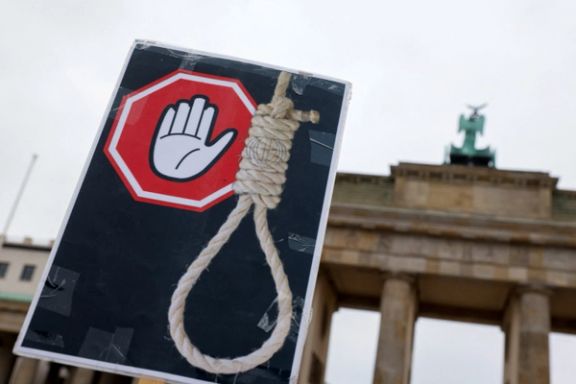
Over 430 civil and political activists in Iran have slammed Iran's execution spree which goes against the country's own legal system.
Via the Telegram channel of Kalameh on Sunday, a statement penned by the activists said “recent executions have been driven more by a desire for retribution, instilling fear, and asserting power, rather than serving justice", as the regime struggles to quash dissent.
The executions of Mohammad Ghobadlou, a protester from the 2022 demonstrations, and Farhad Salimi, a Kurdish political prisoner accused of murder, have sparked widespread condemnation from both domestic and international human rights organizations.
Prominent critics of the Islamic Republic, such as Hamed Esmaeilion, Nazanin Boniadi, Prince Reza Pahlavi, and Masih Alinejad, have called on the international community to address the ongoing execution surge.
Echoing the sentiments, Iran Human Rights Organization has added its voice to the chorus of disapproval, urging the international community to break its silence and take concrete steps to address the alarming escalation of executions in Iran.
United Nations experts said that "at least 834 people were executed in 2023, including 8 people associated with the nationwide protests" of 2022 last year, with dozens more already killed this year.
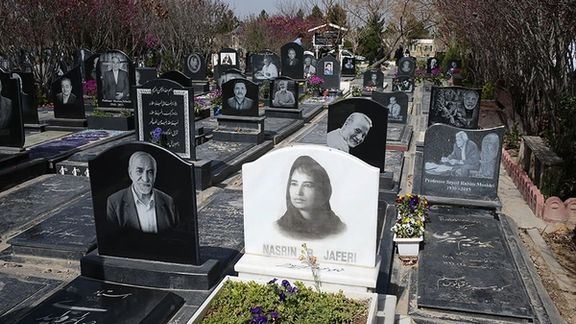
The CEO of Tehran's largest cemetery says the images of unveiled women cannot be shown on headstones in the latest announcement of the regime's crackdown on hijab laws.
Speaking to Didban Iran on Monday, Mohammad Javad Tajik stated that “displaying images of women without hijab on tombstones poses a challenge, and inscriptions and images contradicting societal norms should not be engraved on graves.”
The declaration underscores ongoing efforts by Iranian authorities to enforce compulsory hijab, even in cemeteries. In 2022, Iran initiated measures to enforce hijab on tombstones at Behesht-e Zahra, the country's largest cemetery situated in southern Tehran.
Saeed Ghazanfari, director of Behesht-e Zahra, confirmed in June 2022 that approximately 100 gravestones featuring photos of deceased women without veils had been removed. Ghazanfari indicated that this process would continue in line with the guidance of religious scholars until all such gravestones are removed. A team has been established to prevent the installation of stones bearing unconventional images.
Recent months have witnessed an escalation in government crackdowns on hijab law from heavier surveillance to bans on the likes of education and public spaces, with increasing detentions by morality police. Additionally, the Iranian regime has shuttered thousands of businesses for non-compliance with mandatory hijab, leading to significant job losses.
Prominent establishments, including restaurants and cafes owned by celebrity figures and popular athletes, have faced closure or warnings due to staff and customers violating hijab rules.

Iranian proxies are alleged to have killed six fighters from US-backed Kurdish forces after a drone strike targeted a military academy in a US base near the Al Omar oil field in Syria.
The drone strike is believed to have originated from areas under Syrian government control in Deir al Zor and where Iran-backed militia are known to operate and launch such attacks.
The incident unfolds amidst heightened tensions in the region, with Iran-backed groups expressing solidarity with Palestinians amid escalating conflict between Israel and Hamas. Across the Middle East, Iran's militias in Lebanon, Syria, Iraq and Yemen have launched attacks on Israel and the US since October 7.
Iran-backed Hamas invaded Israel on the most deadly single day for Jews since the Holocaust, sparking a bitter response from Israel which has led to a wider regional conflict.
In response to an attack in Jordan that claimed the lives of three US soldiers and injured dozens more, this weekend saw attacks launched against Iran-affiliated targets in Yemen, Iraq and Syria. It comes after more than 160 attacks have been launched on US targets since October 7 alone, as a response to US support for Israel's right to defend itself in the wake of the October 7 atrocities.

There seems to be a deep sense of insecurity among Iranians due to intense conflicts in the Middle East and a high level of tensions with the United States.
Iranians on social media express their worries every morning about a potential war in the region that could drag Iran into fire. They also discuss a growing economic crisis that is making life increasingly difficult, even for those who are considered well-off.
One of the ongoing concerns is about US responses to Houthi strikes on commercial shipping and attacks by Iranian proxy groups on US forces, that last week left three US soldiers dead in the border area between Syria and Jordan.
Asghar Zargar, a lecturer on international relations, told centrist Entekhab website that "It is unlikely the US would strike Iran." He added that that the United States will not do anything that would threaten the security of the Persian Gulf as Washington does not want to see oil prices rising. However, Zargar noted that if Iran comes under attack, Tehran will launch a heavy retaliatory operation, targeting ships within the range of Iranian forces.
Last week, the looming shadow of a war involving Iran led to an extraordinary rise in exchange rates, bringing the price of every US dollar close to 600,000 Iranian rials.
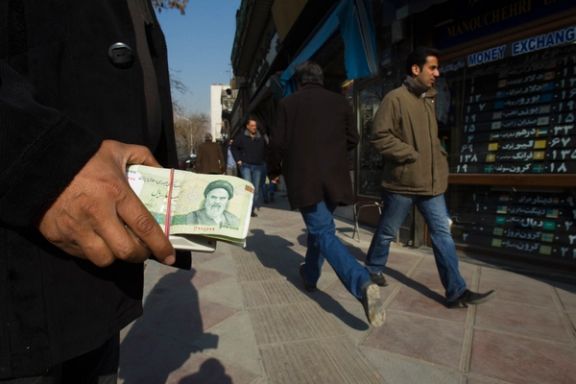
Zargar further explained that now with insecurity in the Red Sea region, the United States will not risk threatening the security of the Persian Gulf. On the other hand, the Americans are aware that Iran will not remain silent if its territory comes under attack, which would set the Persian Gulf ablaze.
For ordinary Iranians, however, it is not a matter of pride or military might. It is a matter of life and death and survival under pressure.
The pressure from America, is not the only threat perceived by Iranians. The former head of the parliament's National Security and Foreign Relations Committee, Heshmatollah Falahatpisheh said last week, "The Russians have made Iran their accomplice and partner in crime in their war in Ukraine."
Falahatpisheh added that "From Syria to Palestine, the Russians position on Iran's strategic depth has been one of treason. They wanted Iran to be their partner in crime and that is why they said that they get their drones from Iran."
Iran’s militant proxy forces in Iraq and Syria have launched more than 160 rocket and drone attacks on US forces since mid-October. Zargar, who lives in Tehran and must be mindful of his public statements, noted that US forces have faced attacks in the region since 2003, with approximately 4,000 US troops losing their lives in military operations. However, the recent deaths of three US soldiers have heightened American sensitivity to such incidents. Still, Zargar suggested that the US is more likely to attack Iran's interests in the region rather than striking targets within Iran.
Highlighting the danger of Iranian officials and commanders focusing on missile development and using them against neighbors, former Foreign Minister Javad Zarif quoted former President and Expediency Council Chief Akbar Hashemi Rafsanjani, who said, "Missiles are good but they are not the answer to every problem." Zarif added that in today's world, there are multiple sources of power, and Iran should recognize its area of relative superiority in the international arena. He suggested that Iran advocate the idea of a cease-fire in the Gaza war to reduce international pressure on Tehran.
Zarif added: "In today's world there are multiple sources of power, but we have still not recognized our area of relative superiority," meaning that officials and commanders should not be deceived by their own words about Tehran's massive missile power.